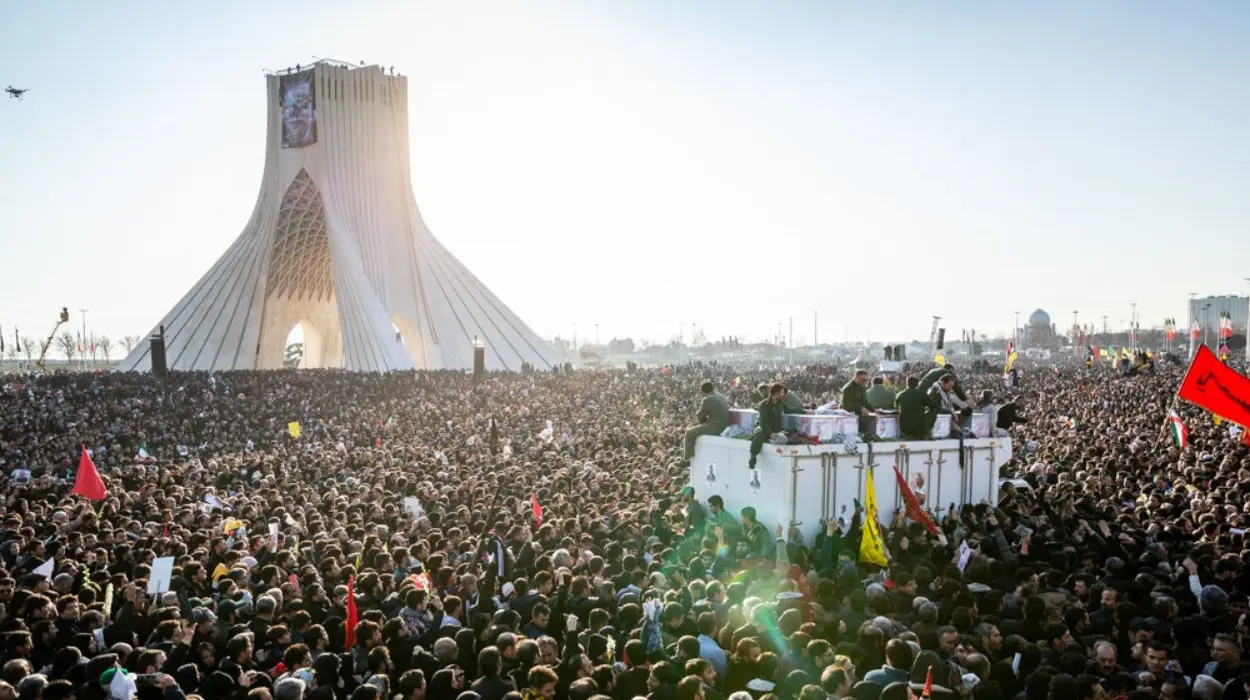Media playback is unsupported on your device
A huge crowd in Iraq's capital Baghdad is taking part in a funeral procession for the Iranian military commander Qasem Soleimani, who was killed in a US air strike on Thursday.
Soleimani was the architect of Iran's Middle East operations. Iran has vowed to take "severe revenge" for his death.
The gathering in Baghdad on Saturday marked the beginning of days of mourning for Soleimani.
His body is to be returned to Iran for a funeral and burial in his home town.
The crowds in Baghdad were also there to mourn the death of Abu Mahdi al-Muhandis, an Iraqi who commanded the Iranian-backed Kataib Hezbollah group and effectively led the Popular Mobilisation units – an umbrella of militias in Iraq dominated by groups aligned with Iran.
Mourners started gathering in Baghdad from the early hours, ahead of the start of the procession, waving Iraqi and militia flags and chanting "death to America". The procession snaked though the streets, some carrying portraits of Soleimani and some of Iran's Supreme Leader, Ayatollah Ali Khamenei.
Reports said the bodies of the Iranians would then be flown on Saturday evening to Iran, which has declared three days of mourning for the assassinated general. His funeral is to be held on Tuesday in his hometown of Kerman in central Iran.
Some Iraqis, conversely, celebrated in Baghdad's streets at the news of Soleimani's death. He was accused of orchestrating violent crackdowns on peaceful pro-democracy protests there in recent months.
Iran's retaliation is certain, but when, where, how is not. For now, the priority is to cement Qasem Soleimani's status as a national hero, to ensure he remains powerful in death as in life.
Elaborate plans for his funeral have been expanded, a mix of carefully scripted ceremony with outpourings of grief filling the streets. It begins in Baghdad where he died, and where so much of his legacy lives.
From there his remains travel to Iran's holy city of Mashhad, to his hometown Kerman, and then to Tehran where the supreme leader will preside over final prayers – a rare honour, to send another signal. Ayatollah Khamenei has promoted his loyal officer to lieutenant general.
More important is to elevate his martyrdom, to draw in rivals who resented his status and Iranians who reviled his costly foreign adventures. Iranian leaders hope his killing will unite a nation as it stares at a far more uncertain future.
Fresh airstrikes in Iraq
Iraqi state television said on Friday there had been another air strike in the country, 24 hours after the killing of Soleimani. An Iraqi army source told the Reuters news agency that six people were killed in the new strike, which hit a convoy of Iraqi militia in the early hours of Saturday morning local time.
A US military spokesman denied that the American-led coalition fighting in the region was responsible.
"FACT: The Coalition @CJTFOIR did NOT conduct airstrikes near Camp Taji (north of Baghdad) in recent days," said Colonel Myles Caggins III, in a post on Twitter.
The US said it had deployed an additional 3,000 troops to the Middle East to help respond to any backlash from the strike.
Speaking at a news conference at his Mar-a-Lago resort in Florida, US President Donald Trump said: "The United States military executed a flawless precision strike that killed the number one terrorist anywhere in the world, Qassem Soleimani."
Mr Trump said Soleimani was "plotting imminent and sinister attacks on American diplomats and military personnel, but we caught him in the act and terminated him".
But Trump administration officials did not give any details about what planned attacks had prompted them to move quickly to kill Soleimani. Both President Barack Obama and President George W Bush rejected a strike on the general as too risky.
The US state department issued a warning in the wake of the strike, advising American citizens to leave Iraq immediately via any means possible.
How did Iran react?
In a statement following Soleimani's death, Ayatollah Khamenei said: "His departure to God does not end his path or his mission, but a forceful revenge awaits the criminals who have his blood and the blood of the other martyrs last night on their hands."
Iranian news agency Tasnim quoted a senior Revolutionary Guards general as saying the country would "punish Americans wherever they are within reach of the Islamic Republic".
General Gholamali Abuhamzeh said 35 US targets had been identified in the region, "as well as Tel Aviv" – the most populous city in Israel. He also raised the prospect of attacks on ships in the Gulf.
"The Strait of Hormuz is a vital point for the West and a large number of American destroyers and warships cross there," he said.
Simmering US-Iranian hostilities had escalated rapidly last week after the US conducted air strikes in Iraq and Syria against an Iran-backed Iraqi militia, which the US blamed for an earlier rocket attack that killed an American civilian contractor. Pro-Iranian militia attacked the US embassy in Baghdad in response.
In a letter to the UN Security Council, responding to the strike on Soleimani, Iran's UN ambassador Majid Takht Ravanchi said that Iran reserved the right to self-defence under international law. Analysts said Iran could deploy cyber-attacks against the US, or attempt to strike US military targets or interests in the Middle East.
How does Iraq fit into this?
Iran supports a variety of Shia militia groups in neighbouring Iraq. Soleimani had just arrived at Baghdad airport and was travelling in a convoy alongside officials from such militia when their cars were hit by several US missiles.
Al-Muhandis, the Iraqi militia leader who was also killed in the strike, commanded the Kataib Hezbollah group – also backed by IranRead More – Source


